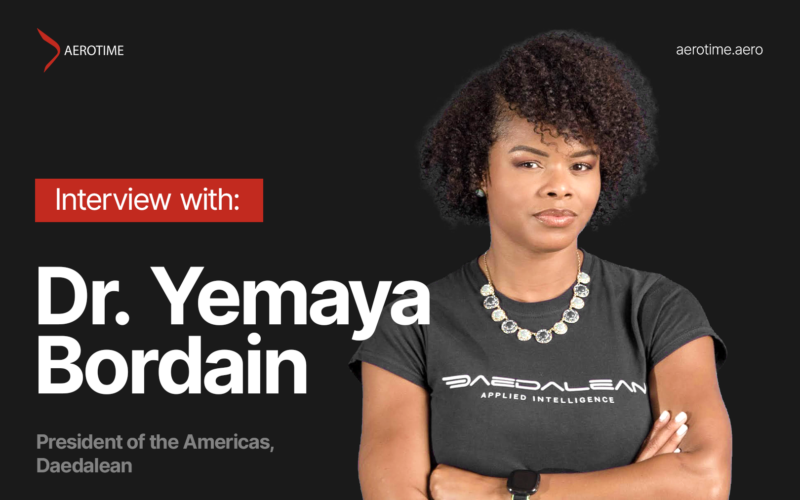If you are looking for an inspirational story of personal and professional achievement in aerospace science and business, look no further than Dr. Yemaya Bordain.
Hailing from a disadvantaged background, Bordain rose to become the first African American woman to gain a PhD in Electrical and Computer Engineering at the University of Illinois at Urbana-Champaign. She then went on to hold several senior executive roles at Intel and, since 2022, has been President of the Americas at Daedalean AI, a Swiss aerospace technology firm developing autonomous flight systems for aircraft.
Speaking with AeroTime, Bordain shared details about a life and career that exemplifies overcoming obstacles and inspirational leadership.
Bordain’s passion for the aerospace sector goes back to her grad school years, when she conducted research on materials science and high-performance polymers for space applications.
She later joined Intel, taking part in a leadership program. While at the microprocessor giant, she helped design new internal mechanisms to foster innovation within the company and provide a platform for would-be intrapreneurs to get the support necessary to turn innovative ideas into reality.
The quest to solve complex engineering problems has been a constant source of motivation for Bordain throughout her career and a force propelling her forward, be it in science or in more commercially oriented roles. At Intel, for example, she was instrumental in bringing to the market a number of aerospace applications derived from the firm’s commercial electronics microprocessor technology.
It is precisely in this capacity that she got to know avionics software firm Daedalean AI, her current employer.
The idea of certifying artificial intelligence and machine learning technology to enhance flight safety, a key purpose of Daedalean’s solutions, was the sort of challenge that Bordain found too enticing to let pass.
As an engineer, she sees the capacity to solve complex problem statements as an integral element of her own personal brand. She prefers to always tackle the hardest problems head-on.
When reflecting on her achievements, Bordain is full of praise for the community support system she relied upon along the way, from first grade all the way through to college.
To this she added another essential component: her own personal uncompromising commitment and determination to succeed. Hers is a path that has not been devoid of obstacles and difficulties, which Bordain has often overcome through sheer grit and perseverance. She referred to resilience as a superpower.
“Resilience is coping and thriving even in very difficult situations,” Bordain told AeroTime. “It is the ability to get back up when you fail.”
Resilience is also a necessary quality when confronting the realities of the aerospace industry, in which the regulatory requirements often slow down the adoption of new innovations. While this caution is often rooted in perfectly reasonable safety requirements, it is a factor that those moving into aviation with a commercial startup mentality should take into account.
“There is a big difference between building a prototype and a production system that can be certified. That’s what takes the long time,” Bordain said.
“You need to have an incredible amount of resilience in order to be able to stick with it and get through the process,” she warned.
Aware of the fact that her own background often stood out in the academic and professional environment in which she has developed, Bordain is committed to providing mentorship to others as well as helping new young talent reach its full potential.
She also mentioned “impostor syndrome” as something she had previously experienced when progressing through the industry and encouraged those experiencing this to reach out to friends, peers or mentors.
She said: “Having impostor syndrome is one thing, how we react to it is a whole other thing. The most courageous of us feel that fear, that hesitation, the doubt about whether we can do it or not, but we simply go and do it. I think this is the best advice I can give to others.”
Bordain credited a paper about the Airbus A320 fly-by-wire system for triggering her interest in avionics, a field that she is currently focused on through her work for Daedalean AI.
Talking more generally about her work in aerospace, Bordain highlighted the requirement of accessible air transportation in enabling people to establish and keep connections. She stressed the importance of being able to work and live in different places to pursue new opportunities without having to cut links with your roots.
“This is one of the reasons I joined Daedalean AI,” she said. “We really do believe in this connected world, where people are able to have access to the world’s opportunities and we think that providing through accessible air transportation is the way we want to go. This is the way we are contributing to this.”

